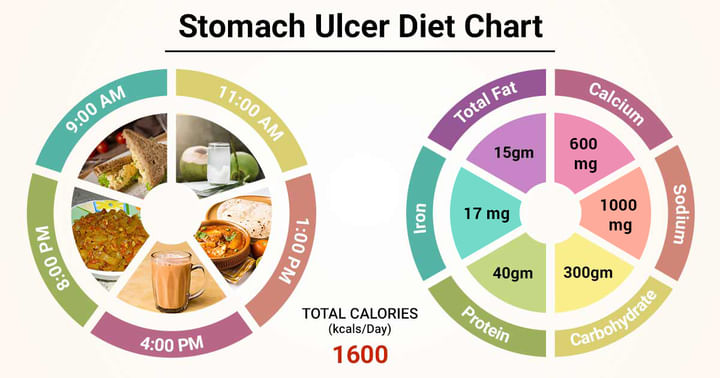Diet Chart For stomach ulcer
Last Updated: Jan 20, 2025
About
An ulcer in the stomach is known as a gastric ulcer while that in the first part of the intestines is known as a duodenal ulcer. The most common symptoms of a duodenal ulcer are waking at night with upper abdominal pain or upper abdominal pain that improves with eating. With a gastric ulcer the pain may worsen with eating. The pain is often described as a burning or dull ache. Other symptoms include belching, vomiting, weight loss, or poor appetite. About a third of older people have no symptoms. Complications may include bleeding, perforation and blockage of the stomach. Bleeding occurs in as many as 15% of people.
Common causes include the bacteria Helicobacter pylori and non-steroidal anti-inflammatory drugs (NSAIDs). Other less common causes include tobacco smoking, stress due to serious illness, Behcet disease, Zollinger-Ellison syndrome, Crohn disease and liver cirrhosis, among others. Older people are more sensitive to the ulcer-causing effects of NSAIDs. The diagnosis is typically suspected due to the presenting symptoms with confirmation by either endoscopy or barium swallow. H. pylori can be diagnosed by testing the blood for antibodies, a urea breath test, testing the stool for signs of the bacteria, or a biopsy of the stomach. Other conditions that produce similar symptoms include stomach cancer, coronary heart disease, and inflammation of the stomach lining or gallbladder inflammation.
Diet does not play an important role in either causing or preventing ulcers. Treatment includes stopping smoking, stopping NSAIDs, stopping alcohol and giving medications to decrease stomach acid. The medication used to decrease acid is usually either a proton pump inhibitor (PPI) or an H2 blocker with four weeks of treatment initially recommended. Ulcers due to H. pylori are treated with a combination of medications such as amoxicillin, clarithromycin and a PPI. Antibiotic resistance is increasing and thus treatment may not always be effective. Bleeding ulcers may be treated by endoscopy, with open surgery typically only used in cases in which it is not successful.
Diet Chart
| Sunday | |
| Breakfast (8:00-8:30AM) | Brown bread Egg sandwich (1) + 1 apple |
| Mid-Meal (11:00-11:30AM) | Coconut water (1 glass) + 2 biscuits |
| Lunch (2:00-2:30PM) | Roti (2) + Soy bean Curry (1 cup) + 1/2 cup curd |
| Evening (4:00-4:30PM) | Tea (1 cup) + 1 Roasted Papad/ murmure/ bhuna chana/ roasted namkeen |
| Dinner (8:00-8:30PM) | Roti (2) + Bottle Gourd Curry (1 cup) |
| Monday | |
| Breakfast (8:00-8:30AM) | Brown bread Potato sandwich (1) + 1 cup low fat curd |
| Mid-Meal (11:00-11:30AM) | 1 cup chhach |
| Lunch (2:00-2:30PM) | rice (1 cup) + Fish/ chicken Curry (1 cup) + cucumber salad |
| Evening (4:00-4:30PM) | Tea (1 cup) + 1 Roasted Papad/ murmure/ bhuna chana/ roasted namkeen |
| Dinner (8:00-8:30PM) | Roti (2) + Pointed Gourd Curry (1 cup) |
| Tuesday | |
| Breakfast (8:00-8:30AM) | Brown bread vegetable sandwich (1) + 1 pear |
| Mid-Meal (11:00-11:30AM) | 1 cup chana sattu |
| Lunch (2:00-2:30PM) | Roti (2) + Mushroom n Green pea Curry (1 cup) + 1/2 cup curd |
| Evening (4:00-4:30PM) | Tea (1 cup) + 1 Roasted Papad/ murmure/ bhuna chana/ roasted namkeen |
| Dinner (8:00-8:30PM) | Roti (2) + Beetroot Curry (1 cup) |
| Wednesday | |
| Breakfast (8:00-8:30AM) | vegetable Poha (1 cup) + Pomegranate juice (1 glass) |
| Mid-Meal (11:00-11:30AM) | 1 cup chhach |
| Lunch (2:00-2:30PM) | Roti (2) + Chana Dal (1 cup) + 1 cup karela vegetable + green chutney |
| Evening (4:00-4:30PM) | Tea (1 cup) + 1 Roasted Papad/ murmure/ bhuna chana/ roasted namkeen |
| Dinner (8:00-8:30PM) | Roti (2) + Potato n Beans Curry (1 cup) |
| Thursday | |
| Breakfast (8:00-8:30AM) | Scrambled Egg (2) +brown bread Toasted (1) + 1 apple |
| Mid-Meal (11:00-11:30AM) | Coconut water (1 glass) + 2 biscuits |
| Lunch (2:00-2:30PM) | Rice (1 cup) + kidney beans Curry (1 cup) + green chutney |
| Evening (4:00-4:30PM) | Tea (1 cup) + 1 Roasted Papad/ murmure/ bhuna chana/ roasted namkeen |
| Dinner (8:00-8:30PM) | Roti (2) + lotus stem (1 cup) + green chutney |
| Friday | |
| Breakfast (8:00-8:30AM) | Mashed Potato n Carrot Sandwich (1) + 1 cup curd |
| Mid-Meal (11:00-11:30AM) | 1 cup chhach |
| Lunch (2:00-2:30PM) | Roti (2) + Moong Dal (1 cup) + 1 cup lady finger + green chutney |
| Evening (4:00-4:30PM) | Tea (1 cup) + 1 Roasted Papad/ murmure/ bhuna chana/ roasted namkeen |
| Dinner (8:00-8:30PM) | Roti (2) + Potato n Drumstick Curry (1 cup) |
| Saturday | |
| Breakfast (8:00-8:30AM) | Besan Cheela with paneer stuffing (2) + Pomegranate Juice (1 glass) |
| Mid-Meal (11:00-11:30AM) | 1 cup chana sattu |
| Lunch (2:00-2:30PM) | Roti (2) + Chicken Curry (1 cup) + onion salad |
| Evening (4:00-4:30PM) | Tea (1 cup) + 1 Roasted Papad/ murmure/ bhuna chana/ roasted namkeen |
| Dinner (8:00-8:30PM) | Roti (2) + Broad Beans Curry (1 cup) |
Food Items To Limit
- Coffee and Carbonated Beverages : affeinated and decaffeinated coffee and tea should be avoided because they stimulate acid production and can cause indigestion, especially in individuals with stomach ulcers.
- Alcohol : lcohol can irritate and erode the lining of the stomach and small intestine and should be avoided by individuals with stomach ulcers because of the potential for bleeding and inflammation.
- Spicy and Acidic Foods : Managing acid reflux is important because it is related to stomach ulcers. Avoid spicy foods, such as chilies, hot peppers and hot sauce. These foods can increase stomach acid, trigger acid reflux and worsen symptoms associated with stomach ulcers.
- Other Foods : In addition to coffee, alcohol and carbonated beverages, dieticians recommends limiting refined foods, such as white bread, pasta and sugar; red meats; and trans fats found in commercially baked goods and processed foods.
Do's And Dont's
Do's:
- Having 5 small easily digestible meals a day at proper intervals is a key to good digestive health. Eating slowly without talking and chewing the food properly also improves digestion. It reduces intestinal gas as less air is swallowed during the eating process.
- Any kind of physical activity which leads to sweating improves the process of metabolism and digestion in the body. Breathing exercises and yoga can bring relief from bloating, flatulence and other symptoms of indigestion and intestinal gas.
- Drinking 8-10 glasses of water every day is mandatory to prevent any gastric complications. Drinking 1 glass of tender coconut water at mid-morning helps in improving the condition.
- Probiotics are the friendly bacteria of the gut. They help in breaking down the food and making it easy for the body to digest it. Fermented milk products like curd (homemade) contain the bacteria lactobacillus which is known to promote digestion.
- Non glutenous grains, non citric fruits and vegetables, moderate fiber intake and lean animal proteins are the best choices.
Don'ts:
- Avoiding foods like complex carbohydrate and fatty proteins (difficult to break down and longer time for digestion) can be helpful.
- Avoiding alcohol and smoking is essential to recover from a gastric attack. Prolonged intake of these could also cause irrepairable damage to the gut.
- Staying away from certain medications like acetaminophens, analgesics, ibuprofen, non steroidal anti inflammatory drugs is important in preventing gastritis.
- Caffeinated beverages like sodas, cold drinks, tea and coffee are best be avoided.
- Keeping away from refined wheat, tomatoes, lemons, red meat etc is essential for fast and better recovery.
- Anything too hot or too cold and some spices like black pepper, red chili powder, too much green chilli powder should be avoided and if taken in limited amounts.
- Vegetables like cabbage, broccoli, brussel sprouts, beans are tougher on the gut and should be avoided. If taken should be in less amounts in breakfast and/or lunch, not at dinner.
Food Items You Can Easily Consume
- Cereals & Pulses: Whole grain cereals (rice, oats, jowar, bajra and ragi) and pulses (red gram, green gram, bengal gram and black gram dals).
- Fruits & vegetables: Fruits (stewed apple, banana, papaya, pomegranate, pear, melons (water melon, musk melon) and vegetables (all gourds, ladies finger, tinda, green leafy vegetables (indian spinach, fenugreek leaves, corriander leaves).
- Meat, Fish & Poultry: Lean meat, skin less chicken, fish (mackerel, trout, sardine, salmon, tuna).
- Milk & Milk products: Yoghurt, curd, paneer, chacch.
- Nuts & Oils: Almonds, walnuts, pista, olive oil, vegetable oil, mustard oil.
References
- Reese RE, Andrews FM. Nutrition and dietary management of equine gastric ulcer syndrome. Veterinary Clinics of North America: Equine Practice. 2009 Apr 1;25(1):79-92. [Cited 02 July 2019]. Available from:
- Hirohata T, Kono S. Diet/nutrition and stomach cancer in Japan. International journal of cancer. 1997;71(S10):34-6. [Cited 02 July 2019]. Available from:
- Marotta RB, Floch MH. Diet and nutrition in ulcer disease. The Medical clinics of North America. 1991 Jul;75(4):967-79. [Cited 02 July 2019]. Available from:
Table of content
Find Dietitian/Nutritionist near me
Ask a free question
Get FREE multiple opinions from Doctors



